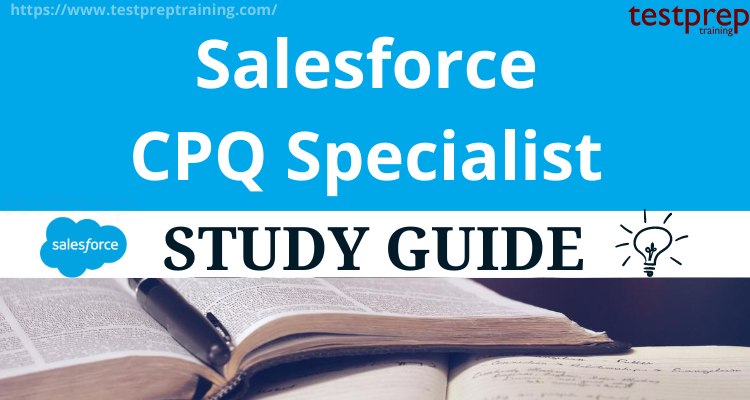Salesforce CPQ is a powerful tool used for streamlining the sales process by automating the quoting and proposal generation process. As a Salesforce CPQ Specialist, you will be responsible for implementing and managing this tool to ensure the sales team has a seamless and efficient process.
In this study guide, I will be covering all the essential topics and skills required to become a certified Salesforce CPQ Specialist. Whether you are new to Salesforce or already have experience with the platform, this guide will provide you with the knowledge and resources needed to pass the Salesforce CPQ Specialist exam. The guide will cover topics such as product and pricing strategies, quoting and proposal generation, discounting and pricing rules, and other critical areas that you need to know to be successful in this role. Additionally, I will be providing tips and tricks for studying and preparing for the certification exam, as well as sharing my personal experiences and insights from working as a Salesforce CPQ Specialist.
So, whether you’re looking to advance your career in Salesforce or just looking to expand your skill set, this study guide is the perfect resource for you. Let’s dive in and start preparing for the Salesforce CPQ Specialist certification exam!
Skills Acquired : Salesforce Certified CPQ Specialist Exam
A candidate for this exam will be able to do the following tasks:
- Firstly, Composite summary variable
- Secondly, Block with discount schedule
- Thirdly, Nested bundles
- Also, Nested quote terms
- Further, Advanced grouping
- Moreover, Advanced quote template topics
Glossary of Salesforce CPQ Specialist Terminology
Here are some common terms and phrases related to Salesforce CPQ (Configure, Price, Quote) Specialist:
- CPQ – Configure, Price, Quote
- Quote – A formal document that outlines the price and details of a product or service being sold
- Product – A product, whether something tangible or intangible, that is sold to customers.
- Price – The amount that a customer pays for a product or service
- Configuration – The specific options and features that a customer selects when purchasing a product or service
- Bundles – A group of products or services that are sold together as a package
- Discount – A reduction in price that is offered to a customer
- Approval Process – A process used to approve quotes or other documents within an organization
- Approval Workflow – A series of steps used to gain approval for a quote or other document
- Contract – A formal paper that describes the rules and terms of a deal or agreement between two parties.
- Renewal – The process of renewing a contract or subscription
- Amendment – A change or modification made to an existing contract
- Quote Line Item – A specific product or service listed on a quote
- Quote Template – A pre-defined format or layout used to create quotes
- Product Configuration Rules – Rules that dictate how a product can be configured based on customer selections and other factors
- Quote Calculation Rules – Rules that determine how the price of a quote is calculated based on product selections and other factors
- Guided Selling – A process that guides customers through the product selection and configuration process
- Revenue Recognition – The process of recognizing revenue from a sale over a period of time
- Renewal Management – The process of managing contract renewals for existing customers
- Quote-to-Cash – The entire process from quote creation to cash collection, including product configuration, pricing, quoting, contracting, and revenue recognition.
Exam preparation resources for the Salesforce CPQ Specialist Exam
Here are some official exam preparation resources for the Salesforce CPQ Specialist Exam with links:
- CPQ Specialist Exam Guide: The CPQ Specialist Exam Guide outlines the exam objectives and provides information on exam format, registration, and logistics. It also includes a study guide with recommended resources for exam preparation.
Link: https://trailhead.salesforce.com/credentials/cpqspecialist
- Trailhead: Salesforce’s free online learning platform offers various modules and trails related to CPQ Specialist Exam preparation. These modules cover topics such as product configuration, pricing and discounting, and quote generation.
Link: https://trailhead.salesforce.com/en/content/learn/trails/cpq-specialist
- Salesforce Help Documentation: Salesforce’s Help Documentation provides detailed information on CPQ configuration, pricing and discounting, and quote generation.
Link: https://help.salesforce.com/articleView?id=cpq_home.htm&type=5
- Salesforce Community: The Salesforce Community is a website where people using Salesforce can talk to each other, ask questions, and share what they know about Salesforce products. In this community, there’s a special area for CPQ where users can get answers to their questions and join conversations.
Link: https://success.salesforce.com/community/success_centers/quote-to-cash
- CPQ Specialist Exam Practice Test: Salesforce provides a practice test that mimics the real exam. It has 60 multiple-choice questions and gives you feedback on which answers are right and which ones are wrong.
Link: https://trailhead.salesforce.com/credentials/cpqspecialist/practice-test
Expert Tips and Tricks for Salesforce CPQ Specialist Exam
here are some Excel tips and tricks that might be helpful for the Salesforce CPQ Specialist Exam:
- Use keyboard shortcuts: Excel has many keyboard shortcuts that can save you time and make your work easier. For example, Ctrl + C to copy, Ctrl + V to paste, Ctrl + Z to undo, Ctrl + X to cut, etc.
- Use filters: Excel has a filter option that can help you sort and analyze data. You can filter data by criteria, such as color, value, or text.
- Use PivotTables: PivotTables are a strong tool for making sense of lots of data. They help you make summaries, charts, and reports from that data.
- Use conditional formatting: Conditional formatting lets you emphasize cells when they meet specific conditions. For instance, you can make cells stand out if they have particular text, numbers, or dates.
- Use functions: Excel has many built-in functions that can help you perform calculations and manipulate data. Some common functions include SUM, AVERAGE, MAX, MIN, IF, COUNTIF, and VLOOKUP.
- Use charts: Charts can help you visualize data and make it easier to understand. Excel has many different types of charts, including bar charts, line charts, pie charts, and scatter plots.
- Use named ranges: Named ranges allow you to assign a name to a specific range of cells in your worksheet. This can make it easier to reference the cells in formulas and functions.
- Use data validation: Data validation allows you to restrict the type of data that can be entered into a cell. For example, you can require that a cell only accept numbers, or that a date be entered in a specific format.
- Use macros: Macros are a method to make Excel do repetitive jobs for you. You can record a macro to do a bunch of things, and then make it run all those steps by clicking just once.
- Use shortcuts: Excel has many shortcuts that can save you time and make your work easier. For example, you can press F2 to edit a cell, or F4 to repeat the last action.
Learning Objectives : Salesforce CPQ Specialist
The Salesforce Certified CPQ Specialist candidate has experience with the Salesforce CPQ solution and has the skills and knowledge of the following concepts.
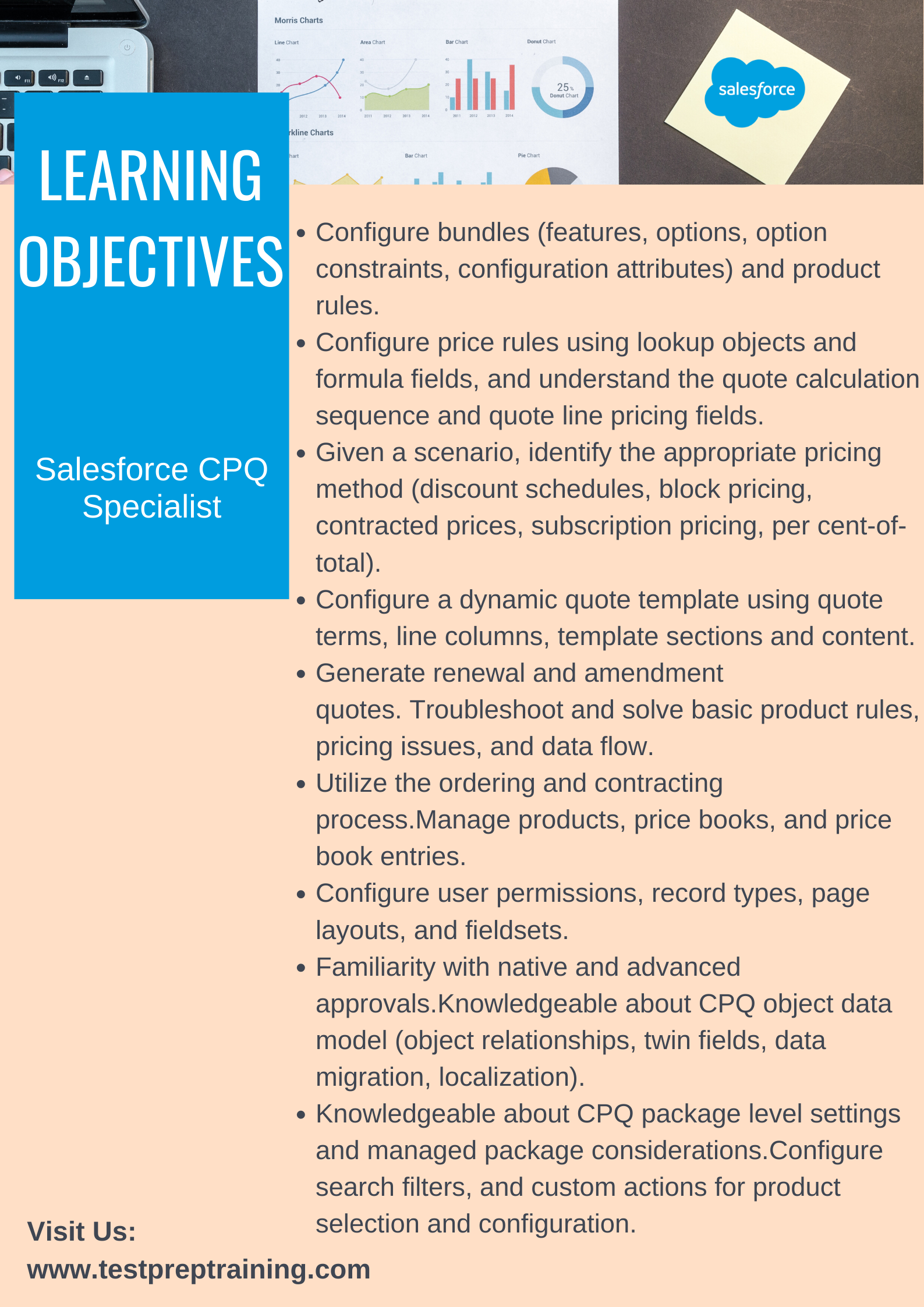
1. Exam Prerequisites
The person becoming a Salesforce Certified CPQ Specialist should be familiar with the Salesforce CPQ platform and its terms. They should also know how to fix basic problems on the platform. Additionally, they need to have worked in a CPQ Specialist role for at least one year.
2. Target Audience | Salesforce Certified CPQ Specialist
This test is made for Salesforce customers, partners, and Salesforce employees who want to show they can design, build, and use quoting flows on the Salesforce CPQ platform.
Salesforce Certified CPQ Specialist includes the following job roles :
- To begin with, IT
- Then, Sales Ops
- Moreover, Technical Architect
- Further, Implementation Consultant
- Additionally, Furthermore, Services
- Also, Product Manager
- Then, Pricing Manager
Study Guide: Salesforce CPQ Specialist
The whole point of having a Study Guide is to direct in the right direction. Keeping that in mind, we assure you, this study guide will offer you with exactly what you need to qualify for the exam. This will allow you to evaluate your readiness to successfully complete your Salesforce CPQ Specialist Certification Preparation.
Furthermore, the Salesforce CPQ Specialist Study Guide provides details on suggested training, hands-on practice, finishing training courses, completing Trailhead trails, and self-study. All of this is aimed at helping you pass the exam.
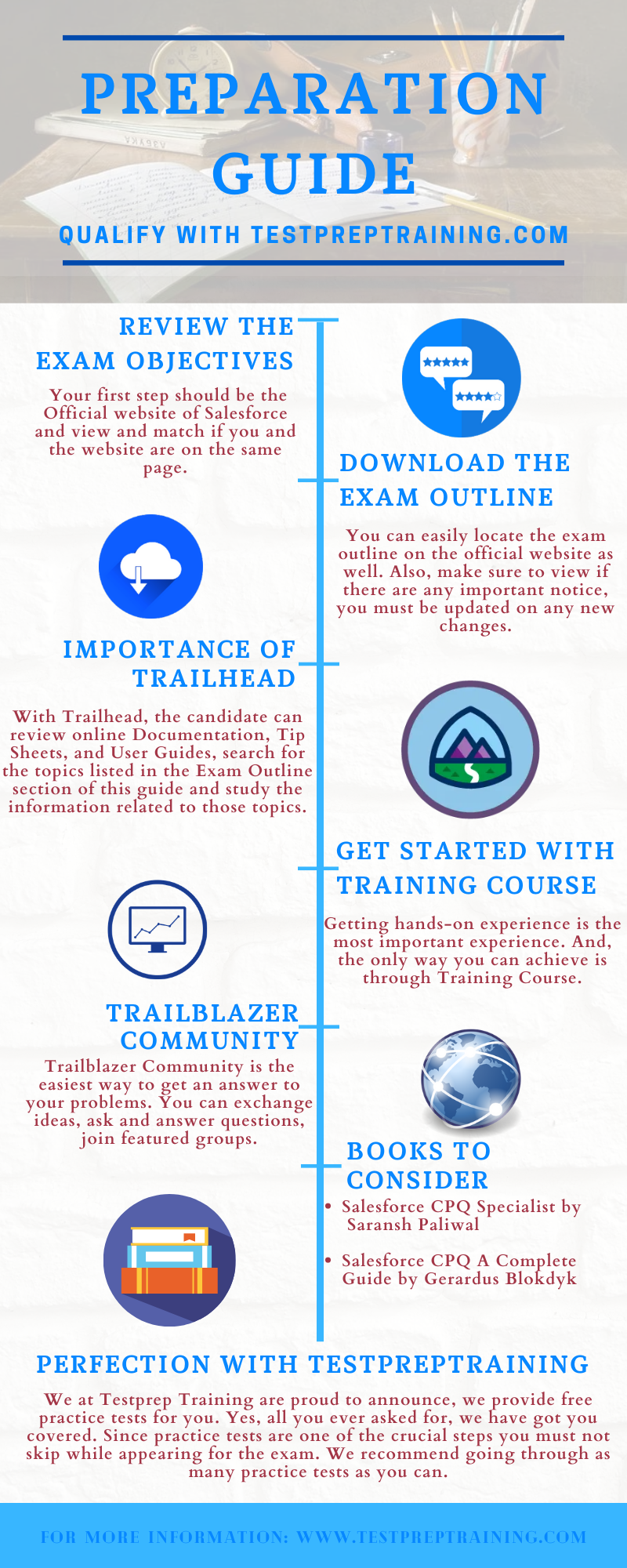
Step 1- Review the Exam Objectives
Before you start getting ready for the certification exam, it’s important to ensure you have the latest information. Certification exams often change as new technology develops. So, your initial step should be to visit the Official website of Salesforce and check if your knowledge matches what’s on the website. If not, make sure you get all the new exam information that’s available.
Step 2- Download the Exam Outline
Once you’ve looked at all the Exam Objectives, it’s clear that you should download the PDF file for the Exam Outline. Don’t skip this step because the Exam Outline is a crucial part of any certification exam. You can find it easily on the official website. Also, check for any important notices to stay updated on any new changes. This exam covers the following areas:
Topic 1: CPQ Platform: 23%
- Designing, configuring, and troubleshooting price rules using lookup objects and formula fields to meet business requirements. (Salesforce Documentation: Price Rule Considerations, Using Price Rule Lookup Queries Against Custom Objects)
- Applying an understanding of quote calculation sequence and quote line pricing fields to meet pricing and business requirements. (Salesforce Documentation: Price Rule Considerations, Pricing and Calculation Package Settings, CPQ Quote Calculation Sequence)
- Utilizing out-of-the-box and custom permissions, record types, fieldsets, and page layouts to ensure users can fulfill their job requirements. (Salesforce Documentation: Salesforce CPQ Profile Permissions)
- Demonstrating knowledge of CPQ data flow across CPQ objects. (Salesforce Documentation: Mapping Custom Fields Between Objects)
- Demonstrating knowledge about the CPQ object data model as it relates to data migration. (Salesforce Documentation: Implementing CPQ – Data Migration Considerations And Best Practices)
- Setting up CPQ for localization and multi-currency for international customers and users. (Salesforce Documentation: Guidelines for Using Salesforce CPQ in Multicurrency Orgs, Translating Salesforce CPQ Records, Multi-currency in Salesforce CPQ)
- Determining the necessary CPQ package-level settings. (Salesforce Documentation: CPQ Package Settings)
- Determine how the CPQ managed package fits within a Salesforce org. (Salesforce Documentation: Salesforce CPQ Installation)
Topic 2: Bundle Configurations: 17%
- Setting up a bundle structure to meet business requirements. (Salesforce Documentation: Product Bundles, Constraint Guidelines, Considerations for Product Options, Configuration Attribute Guidelines)
- Setting up product rules to meet business requirements. (Salesforce Documentation: Product Rule Guidelines, Product Rules)
Topic 3: Pricing: 16%
- Identifying the appropriate pricing strategy (discount schedules, block pricing, contracted prices, subscription pricing, per cent-of-total, usage-based pricing). (Salesforce Documentation: Product Pricing Methods, Term Discount Schedules for Subscription Products, Slab Discount Schedules with Block Prices, Contracted Pricing, Block Pricing)
- Determining expected pricing outcomes. (Salesforce Documentation: Product Pricing Overview, Apply Partner Discounts first in the price waterfall with Salesforce CPQ)
Topic 4: Quote Templates: 7%
- Setting up a quote template to meet business requirements. (Salesforce Documentation: Building Your CPQ Documents with CPQ Templates, Create, Preview, and Activate Quote Templates, Styling Your CPQ Quote Documents, Conditionally Show Template Sections
Topic 5: Product Selection: 7%
- Using search filters, fieldsets, and custom actions to enable product selection and configuration. (Salesforce Documentation: Create a Filtering Custom Action, Search Filters)
Topic 6: Orders, Contracts, Amendments, and Renewals: 15%
- Demonstrating the data required to generate orders and contracts. (Salesforce Documentation: Guidelines for Creating Orders, Creating a Contract from an Order, Creating a Contract from an Opportunity, Guidelines for Setting Up CPQ Orders)
- Demonstrating an understanding of how to generate renewal and amendment quotes to meet business requirements. (Salesforce Documentation: Amend Your Contracts and Assets, Amend Your Contracts, Renew Your Contracts and Assets, Amendment Processes)
- Recommending when to use orders, contracts, subscriptions, and assets to meet business requirements. (Salesforce Documentation: Manage Your Subscriptions and Assets, Subscription Guidelines)
Topic 7: Products: 11%
- Demonstrating how to set up products, price books, and price book entries. (Salesforce Documentation: Product, Price Book, Price Book Entry, and Product Schedule Fields, Manage Price Books, Guidelines for MDQ Products, Usage Pricing Guidelines)
- Demonstrating how product catalog setup impacts overall CPQ data flow. (Salesforce Documentation: How To: Salesforce CPQ: Create a Product Catalog)
Topic 8: Approvals: 4%
- Selecting and setting up advanced or native approvals to meet business requirements. (Salesforce Documentation: Setting Up Advanced Approvals)
Step 3- Importance of Trailhead
If you are someone who has already qualified and attained credentials with Salesforce, then you might know the importance of Trailhead. On the other hand, if you are a newbie, then let’s put it out there. Trailhead is a crucial part of your preparation for Salesforce. It lets you access online documents, tip sheets, and user guides. You can search for the topics mentioned in the Exam Outline of this guide and study the information about those topics.
Step 4- Get started with Training Course
Getting hands-on experience is the most important experience for exams like Salesforce CPQ Specialist Certification. And, the only way you can achieve is through Training Course. You can easily get acquainted with training courses for the same. Nonetheless, Salesforce offers the candidate with quite a few options to choose from. So, head to their website, if you want to master your skills. We highly recommend training courses.
The expert-led courses recommended for this exam include:
- Firstly, Salesforce CPQ Admin Essentials for New Administrators (CPQ-201)
- Also, Salesforce CPQ Admin Essentials for Experienced Administrators (CPQ-211)
Step 5- Join the Community- Trailblazer Community
You know sometimes, we’re stuck with some problem or the other. Well, we all are humans, so that an obvious fact. However, what if you’re stuck somewhere with your preparation and need an answer from some expert oo any adviser. Don’t know what to do then?
Take it from us, join a community, and in this case join Trailblazer Community. You’ll thank us later, but this is the easiest way to get an answer to your problems. On joining the community, you can exchange ideas, ask and answer questions, join featured groups.
Step 6- Books to consider
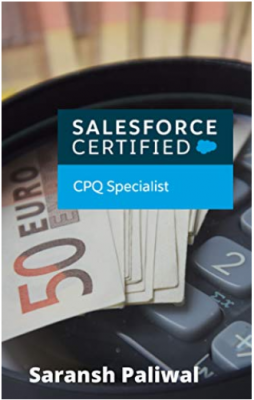
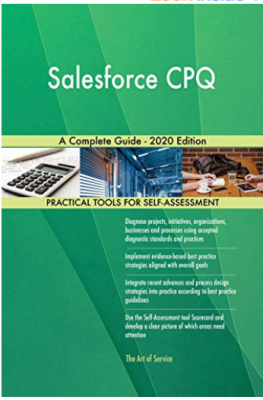
When it comes to certification exams, books might not get enough attention, but we believe they are valuable. Books are a great way to gain knowledge and grasp the Salesforce CPQ Specialist Certification Questions. So, here are some of our recommended books to help you earn your credentials:
- Firstly, Salesforce CPQ Specialist by Saransh Paliwal
- Secondly, Salesforce CPQ A Complete Guide by Gerardus Blokdyk
Step 7- Practice Tests for Perfection
Salesforce CPQ Specialist Practice Exams prepare you for the real exam in a very systematic manner. We know practice makes a man perfect. Therefore attempting an ample number of tests will make you ready for the exam. Moreover these exams help you identify your weaker areas. Strengthening them will surely bring success in the exam. To stay ahead of your competition and boost your confidence you must include practice tests in your Preparations Journey. Lets start practising Now!

